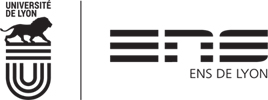Master 2
Advanced mathematics master 2nd year, 2024-2025
Courses are organized in thematic programs, and there will be five such programs in 2024-2025. Courses will start in mid September. However, the programs will also offer refresher courses, that will start during the last week of August. The following five programs will be offered.
Poster for the program.
Slides of the presentation meeting, March 2024.
Partial Differential Equations and Applications
Basic courses
- Evolutionary PDEs (Dragoş Iftimie)
- Calculus of variations and elliptic equations (Filippo Santambrogio)
- A few models and methods for life sciences (Thomas Lepoutre)
Advanced courses
- Optimal transport: introduction and overview (Cédric Villani)
- Systems of Reaction-diffusion equations: global existence and stochastic modelling (Julien Vovelle)
- On the non linear Schrödinger equation (Nikolay Tzvetkov)
- Semiclassical dynamics (Laurent Laflèche)
Probability and statistics
Basic courses
- Stochastic calculus (Marielle Simon)
- Random walks (Thomas Budzinski)
- Concentration of measure in probability and high-dimensional statistical learning (Guillaume Aubrun, Aurélien Garivier, Rémi Gribonval)
- Stochastic modelization and statistical learning (Aurélien Garivier, Clément Marteau)
Advanced courses
- Graphs and ecological networks (Clément Marteau, Thibault Espinasse)
- Neural Networks (Aurélien Garivier)
- Optimal transport and learning (Filippo Santambrogio, Ievgen Reedko, Nicolas Bonneel)
- Inverse problems and parcimony (Yohann de Castro, Rémi Gribonval)
- Scaling limits of interacting particle systems (Oriane Blondel, Christophe Poquet)
- Spectral Theory of random operators (Raphaël Ducatez, Christophe Sabot)
- Phase transitions in spin systems (Christophe Garban)
- Scaling limits for stochastic processes: applications to biology (Hélène Leman and Céline Bonnet)
Number theory
Basic courses
- Local fields (Laurent Berger)
- Algebraic curves and elliptic curves (François Brunault)
- Modular forms (Sandra Rozensztajn)
Advanced courses
- p-adic modular forms (Benjamin Schraen)
- Bruhat-Tits tree of SL(2) and non-Archimedean geometry (Bertrand Rémy)
- Elliptic curves in computational number theory (Benjamin Wesolowski)
Higher Algebra and Formalised Mathematics
Basic courses
- Algebraic rewriting and Categorification (Stéphane Gaussent and Philippe Malbos)
- Foundations of formalised mathematics and higher-dimensional rewriting (Georg Struth)
- Introduction to LEAN (Sophie Morel, Filippo A. E. Nuccio, Xavier-François Roblot)
Advanced courses
- Rewriting theory of higher algebras (Stéphane Gaussent, Philippe Malbos)
- Calculus of Inductive Constructions and Coq (Damien Pous)
- Advanced project on LEAN (Sophie Morel, Filippo A. E. Nuccio and Xavier-François Roblot)
Topics in Complex, Algebraic, Kähler and Symplectic geometries
Basic courses
- Introduction to Kähler geometry (Jean-Claude Sikorav)
- Introduction to Complex algebraic geometry (Antoine Etesse)
- Convexity in symplectic geometry (Klaus Niederkrüger)
- Reductive algebraic group over C (Jérôme Germoni)
Advanced courses
- GIT and Kempf-Ness theorem (Nicolas Ressayre)
- Symplectic capacities (Marco Mazzucchelli)
- Hermite-Einstein metrics and slope stability (Eveline Legendre)
Fonctionnement du MA2
Le master de mathématique avancées, 2ème année (ou MA2), est une formation à la recherche qui s’appuie sur les deux laboratoires de mathématiques de l’Université de Lyon : l’Institut Camille Jordan (Université Lyon 1, INSA Lyon, École Centrale de Lyon, Université de Saint-Etienne), et l’Unité de Mathématiques Pures et Appliquées (École Normale Supérieure de Lyon). Elle est accessible à tout étudiant ayant validé la première année (MA1), ou ayant validé un M1 de mathématiques ou équivalent et accepté par la commission de sélection. Elle fournit les 60 crédits ECTS permettant de compléter un master de mathématiques. Son débouché naturel est une thèse de mathématiques.
Les cours du MA2 sont organisés en parcours thématiques qui changent chaque année. Au premier semestre, chaque étudiant.e suit des cours fondamentaux comptant au total pour 18 ECTS. Au second semestre, il ou elle suit des cours avancés comptant au total pour 18 ECTS, et l’UE séminaire d'anglais, comptant pour 6 ECTS. Sauf exception, avec l’accord du responsable du MA2, ces cours font partie d’un même parcours parmi ceux proposés.
L’année se termine par un stage de quatre mois donnant lieu à la rédaction d’un mémoire et d’une soutenance orale, et comptant pour 18 ECTS.
Plus de détails dans ce document qui reprend ce qui sera dit à la réunion de rentrée 2023.
Le M2 bénéficie du soutien du Labex Milyon.
contacts
Responsable du MA2 :
Nicolas Rougerie
ENS, site Monod, bâtiment GN1 (l’arche), 4e étage
Gestionnaires de scolarité
École normale supérieure
Sophie Bonche
Site Monod, bâtiment LE (accolé au GN1, côté nord de l’allée d’Italie)
bureau 536, allée Allan C. Wilson
04.72.72.85.53
Université Claude Bernard
Aline Ghedira et Ségolène Serre
scolarite.mathematiques@univ-lyon1.fr
Contact
ENS de Lyon
15 parvis René Descartes - BP 7000
69342 Lyon Cedex 07 - FRANCE
Tél. : Site René Descartes (siège) : +33 (0) 4 37 37 60 00
Site Jacques Monod : +33 (0) 4 72 72 80 00



